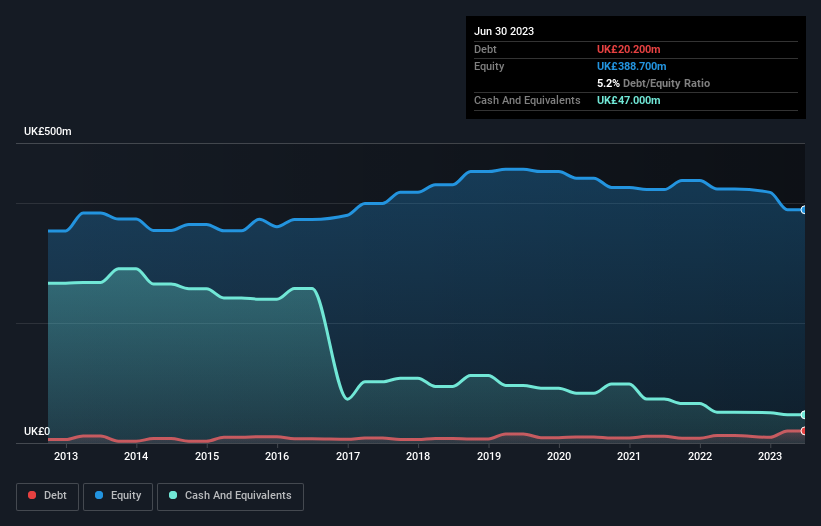
David Iben put it well when he said, 'Volatility is not a risk we care about. What we care about is avoiding the permanent loss of capital.' When we think about how risky a company is, we always like to look at its use of debt, since debt overload can lead to ruin. Importantly, Camellia Plc (LON:CAM) does carry debt. But should shareholders be worried about its use of debt?
When Is Debt Dangerous?
Debt and other liabilities become risky for a business when it cannot easily fulfill those obligations, either with free cash flow or by raising capital at an attractive price. If things get really bad, the lenders can take control of the business. However, a more usual (but still expensive) situation is where a company must dilute shareholders at a cheap share price simply to get debt under control. Of course, the upside of debt is that it often represents cheap capital, especially when it replaces dilution in a company with the ability to reinvest at high rates of return. The first step when considering a company's debt levels is to consider its cash and debt together.
View our latest analysis for Camellia
What Is Camellia's Debt?
The image below, which you can click on for greater detail, shows that at June 2023 Camellia had debt of UK£20.2m, up from UK£12.5m in one year. But on the other hand it also has UK£47.0m in cash, leading to a UK£26.8m net cash position.

How Healthy Is Camellia's Balance Sheet?
Zooming in on the latest balance sheet data, we can see that Camellia had liabilities of UK£86.6m due within 12 months and liabilities of UK£63.8m due beyond that. On the other hand, it had cash of UK£47.0m and UK£38.6m worth of receivables due within a year. So it has liabilities totalling UK£64.8m more than its cash and near-term receivables, combined.
While this might seem like a lot, it is not so bad since Camellia has a market capitalization of UK£137.0m, and so it could probably strengthen its balance sheet by raising capital if it needed to. But we definitely want to keep our eyes open to indications that its debt is bringing too much risk. Despite its noteworthy liabilities, Camellia boasts net cash, so it's fair to say it does not have a heavy debt load!
It was also good to see that despite losing money on the EBIT line last year, Camellia turned things around in the last 12 months, delivering and EBIT of UK£200k. There's no doubt that we learn most about debt from the balance sheet. But it is future earnings, more than anything, that will determine Camellia's ability to maintain a healthy balance sheet going forward. So if you're focused on the future you can check out this free report showing analyst profit forecasts.
Finally, while the tax-man may adore accounting profits, lenders only accept cold hard cash. Camellia may have net cash on the balance sheet, but it is still interesting to look at how well the business converts its earnings before interest and tax (EBIT) to free cash flow, because that will influence both its need for, and its capacity to manage debt. Over the last year, Camellia saw substantial negative free cash flow, in total. While investors are no doubt expecting a reversal of that situation in due course, it clearly does mean its use of debt is more risky.
Summing Up
While Camellia does have more liabilities than liquid assets, it also has net cash of UK£26.8m. So while Camellia does not have a great balance sheet, it's certainly not too bad. There's no doubt that we learn most about debt from the balance sheet. But ultimately, every company can contain risks that exist outside of the balance sheet. For example, we've discovered 4 warning signs for Camellia (2 don't sit too well with us!) that you should be aware of before investing here.
If you're interested in investing in businesses that can grow profits without the burden of debt, then check out this free list of growing businesses that have net cash on the balance sheet.
New: AI Stock Screener & Alerts
Our new AI Stock Screener scans the market every day to uncover opportunities.
• Dividend Powerhouses (3%+ Yield)
• Undervalued Small Caps with Insider Buying
• High growth Tech and AI Companies
Or build your own from over 50 metrics.
Have feedback on this article? Concerned about the content? Get in touch with us directly. Alternatively, email editorial-team (at) simplywallst.com.
This article by Simply Wall St is general in nature. We provide commentary based on historical data and analyst forecasts only using an unbiased methodology and our articles are not intended to be financial advice. It does not constitute a recommendation to buy or sell any stock, and does not take account of your objectives, or your financial situation. We aim to bring you long-term focused analysis driven by fundamental data. Note that our analysis may not factor in the latest price-sensitive company announcements or qualitative material. Simply Wall St has no position in any stocks mentioned.
About AIM:CAM
Camellia
Engages in agriculture and engineering business in the United Kingdom, Bangladesh, India, Kenya, Malawi, South Africa, North America, and South America.
Mediocre balance sheet and slightly overvalued.

